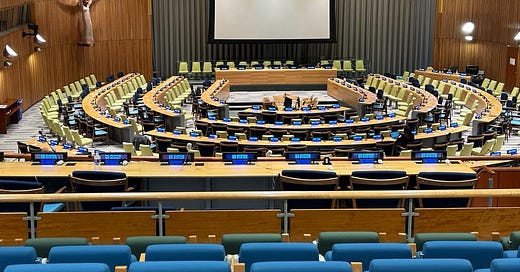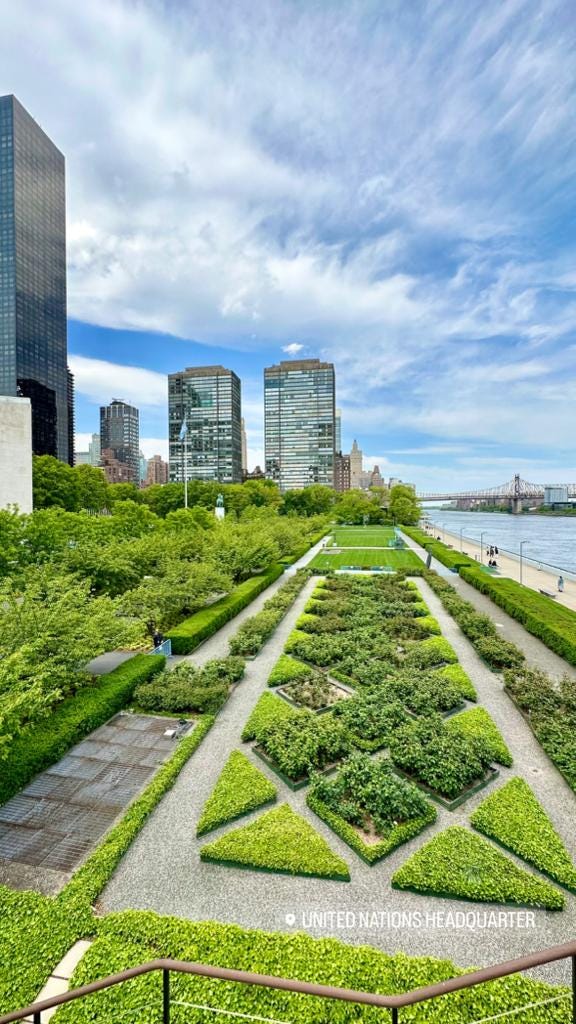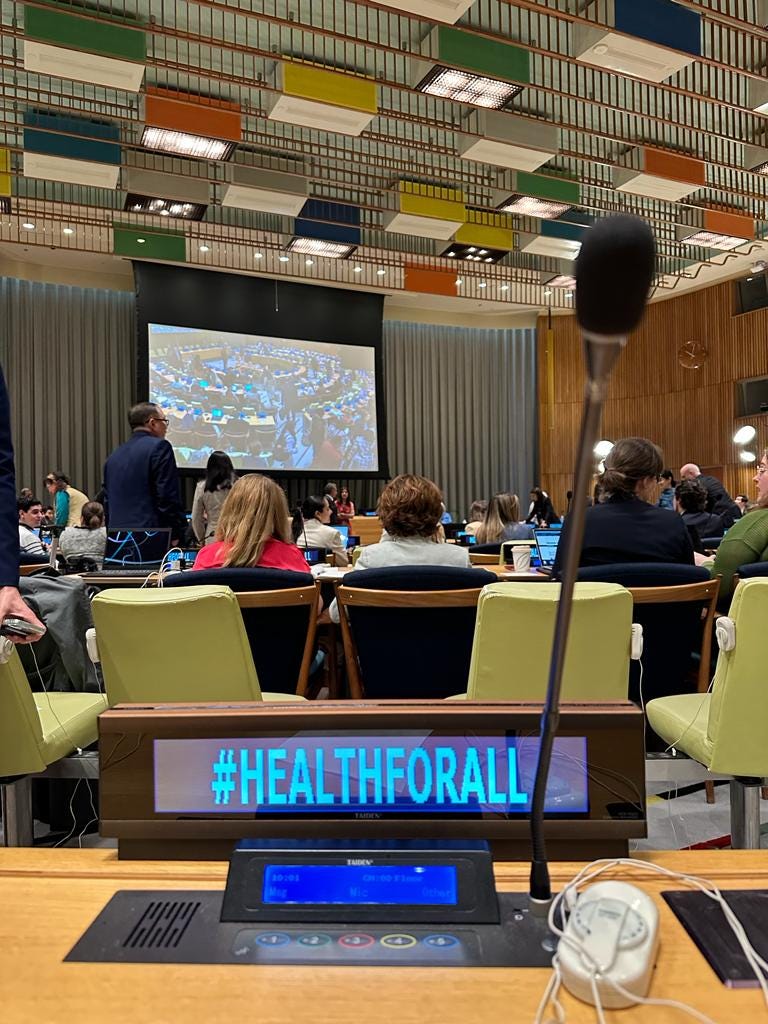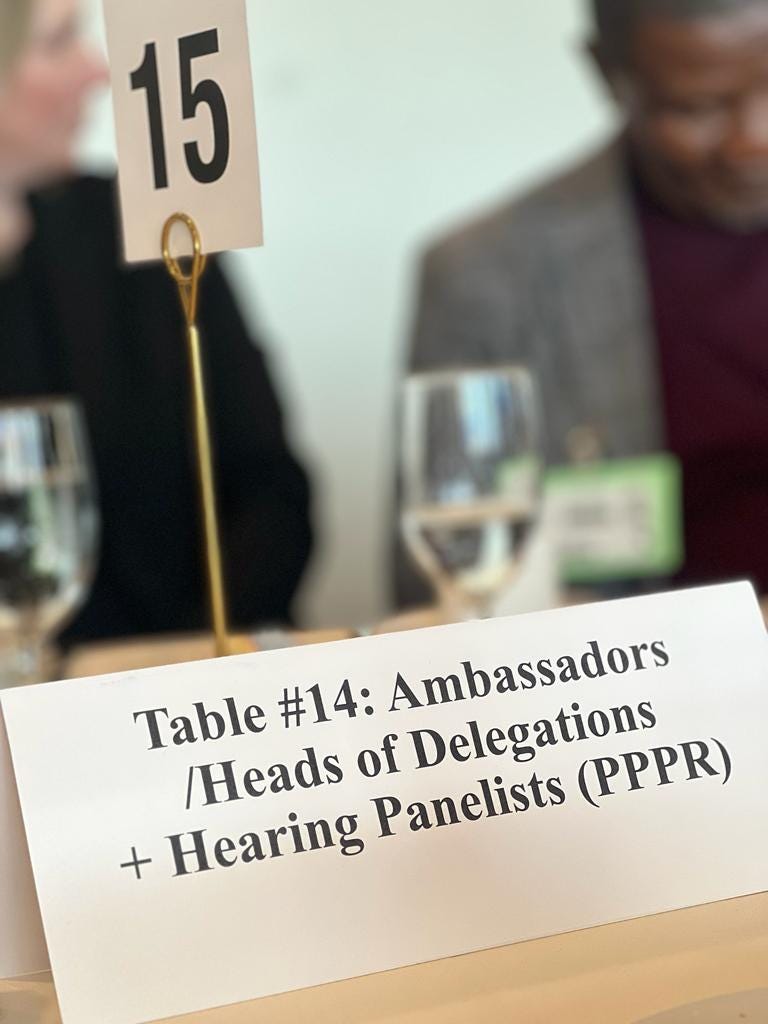Seismic Shifts: From G20 to UNGA - Africa in the Epoch of Global Power Recalibration
Across our world there is a palpable stir. Every keen observer of global politics can feel the vibrations and tremors — a seismic shift or shifts about to happen. While the exact trajectory of these shifts might be unclear, its origins are starkly clear to us who've borne the brunt of unchecked dominance—those who've witnessed their legacies erased, lands pillaged, and identities shattered by centuries of exploitation. We, who've been handed empty promises of unity, only to watch them shatter when true solidarity was demanded.
Global power dynamics, as they stand today, are not organic constructs —they did not materialise from the ether. They were meticulously crafted by intrepid conquerors who ventured beyond their territories, usurping the authority to dictate the religions, languages, and borders of others.
Echoing the timeless wisdom of Frederick Douglass, true power remains unyielding unless vehemently challenged. Today, that challenge for change is brewing. Not in hushed, polite boardrooms, but in the fierce determination of the historically oppressed—women fighting patriarchal conventions, youth rebelling against ageist stereotypes, and communities of color worldwide contesting systems that perpetually undervalue them.
More recently, it is also happening between global powers.
The tremors of this change are acutely felt in the Sahelian crisis, particularly in the Central Sahel countries of Burkina Faso, Mali, and Niger. As armed conflicts intensify and expand, there has been a corresponding rise in human rights violations and forced displacements. These tensions have triggered political upheavals and coups, revealing an underlying resentment against perceived neo-colonial influences. France, a historical powerhouse in the region, now grapples to maintain its foothold. Once a revered voice, it now faces stiff resistance in its former colonies. With countries even considering embracing Russian mercenaries as a counterweight to French influence and ambassadors being ordered to depart, a distinct shift is evident. The coup in Gabon further solidifies this perspective.
Africa's ongoing journey underscores a broader truth: leaders and their nations must navigate this evolving landscape with a deep cognizance of the shifting global power dynamics. In seeking to be part of this global conversation on power, I often find myself echoing sentiments I've voiced about women in leadership: There's an urgency. We can no longer afford the luxury of waiting for a golden invitation. If they don’t provide a seat at the table, we must be audacious—pull up a folding chair. And if barriers persist, let’s overturn conventions: sit atop the table and ensure our voices reverberate.
My life's journey has been one of tireless advocacy for a reimagining of global interrelations; for a rebalancing of power where we have a world pulsating with myriad voices, each having an equal say in molding our shared destiny. The murmurs for example surrounding the potential expansion of BRICS encapsulate this very aspiration. Its trajectory, whether aiming to democratize global power or merely pivot from Western-centric dominance, bears significant implications, particularly for Africa's future role. My pursuit is not just for a superficial redistribution of power but for a genuine realization of equity—a dream of a world where nations aren't judged solely by their military or economic prowess but are cherished as human sanctuaries, where every individual is deserving of respect, dignity, and a purpose-driven life.
Believing that those comfortably ensconced atop power structures would gracefully step aside is a delusion. Just transitions towards justice and equality often face vehement resistance. However, the global mosaic is under metamorphosis. It's imperative that the masses from developing nations aren't perpetually dwarfed by a handful of opulent countries. Jeffrey Sachs's assertion of a transition towards a "post-American, post-Western… truly multipolar world" invites reflection on its implications for peace, stability, equity, and global economics.
Being present in this era, feeling the very ebb and flow of history and power dynamics, is nothing short of a privilege. We stand at a crucial crossroads, both as observers and active participants in this grand global theater. I've often pondered on the nature of power, largely because I've observed the tragic sidelining of innovative solutions and ideas. Absent power, even the most brilliant minds remain marginalized, rarely entering the rooms where impactful decisions are made. And in these rooms, invariably, the narrative is determined by those holding the purse strings.
Yet, with emergent power centers like China and India redefining the global conversation, erstwhile powerhouses face increasing scrutiny and challenges to their traditional hegemony. The intricate dance of power, economy, and health, which is pivotal to my work, illustrates the historical sidelining of continents like Africa. Previously, our demands for equitable treatment were dismissed, partly because of an undue emphasis on financial capability. Without adequate resources, our aspirations, especially in sectors like health, remain stifled. Without financing for example, all of our desires for local production of vaccines and other medical countermeasures and tools end up as mere desires and we are left accepting what we are offered, however insufficient this might be. Without the resources to finance our dreams, they vanish once we awake.
It's tragic how Africa's vulnerability has been starkly exposed in recent times—be it during life-threatening crises like pandemics or when grappling with exploitative international agreements. I have written much about this vulnerability and what we can learn from it. Africa’s repeated relegation to the periphery, whether as a victim of unfavorable trade deals, a dumping ground for global waste, or a mere source of raw materials, underscores the urgent need for recalibration. As global leaders convene for crucial discussions, the plea for a more equitable distribution of power cannot be more pertinent.
I myself have been involved in G20 and ASEAN dialogues, as leaders of the world meet for BRICS meetings last month, the ASEAN Summit this week and as world leaders converge over the next couple of weeks for the G20 Leaders Summit, followed by the United Nations General Assembly and other meetings, it's imperative to again raise the pressing issue of a recalibration of power.
WB Yeats’s poem about a faltering center (and as brilliantly used by Nigeria’s own Chinua Achebe in his classic Things Fall Apart) resonate in today's geopolitical upheavals, wars, and financial tug-of-wars.
Turning and turning in the widening gyre
The falcon cannot hear the falconer;
Things fall apart; the centre cannot hold;
Mere anarchy is loosed upon the world
Things are indeed falling apart. The effects of skewed power are glaring for all to see. For as long as the status quo remains, some parts of the world will keep exporting violence, conflict, and poverty, leading inevitable to mass waves of irregular migration that will in turn lead to instability in many parts of the world, even on the African continent, which as we know also hosts millions of migrants. On the other hand, when nations thrive, they can become a source of support and strength, not just to their own citizens but to their neighbours.
With burgeoning blocs like BRICS and China's growing clout, entities like the United Nations must reevaluate their purpose. The United Nations must realise that we are a long way from 1945 —the world today is not the world in which it was formed. The multilateral system must reform. Even the United Nations Secretary General António Guterres, in a policy brief recently called for “a multilateral system that could be more just, networked and effective.” As Africa clamors for equity, the imperative of self-reliance and funding these aspirations is paramount. We must bolster public institutions, infrastructure, and human capital. Gender equity must be at the forefront, as we can't genuinely progress without empowering our women and girls.
In an era where the traditional modes of financing often come with strings attached, it is paramount for Africa to diversify its portfolio. While public funding has been the cornerstone for many nations, it is time for Africa to tap into the vast reservoirs of private capital. By liaising with regional banks such as African Export-Import Bank (Afreximbank) and African Development Bank (AfDB), Africa can harness the dynamism and innovation inherent in private funding, propelling its development agendas further.
However, attracting and responsibly managing these funds mandates an inward reflection. We must ruthlessly cut down on the endemic wastage, unchecked profligate spending, and the cancer of corruption that has, for too long, stifled our growth. The matter is more than just fiscal responsibility; it's existential. A continent so rich in potential must rise above the dregs of inefficiency and mismanagement to truly realize its destiny. For if Africa is not able to mobilise the resources to fund its development it will be doomed to being on the receiving end, beggars bowl in hand.
A transformative future demands transformative actions. This includes recognising the intricate interplay between health, politics, economy, and gender. Holistic solutions emerge from understanding these interconnections—be it how women's economic empowerment leads to positive community health outcomes or how political decisions prioritising health infrastructure can elevate economic prospects. This underscores that advancements in one domain often necessitate progress in others.
If we label this as a defining moment not just in health but more broadly in development, it mandates comprehensive reforms in both approach and financing. As Africa seeks its rightful place on the global stage, it's my fervent hope that its leaders rise to these challenges, ensuring the continent isn't merely absorbed into another inequitable power structure but takes its deserved seat at the global decision-making table.
In the orchestra of nations, for far too long, Africa has been handed the subtle, background instruments, its melodies often drowned out by louder counterparts. Yet, every musician knows the symphony's depth lies in the interweaving of each note, every instrument. The days of Africa being a passive spectator are over; the continent must assert itself in the high-stakes game of global geopolitics.







